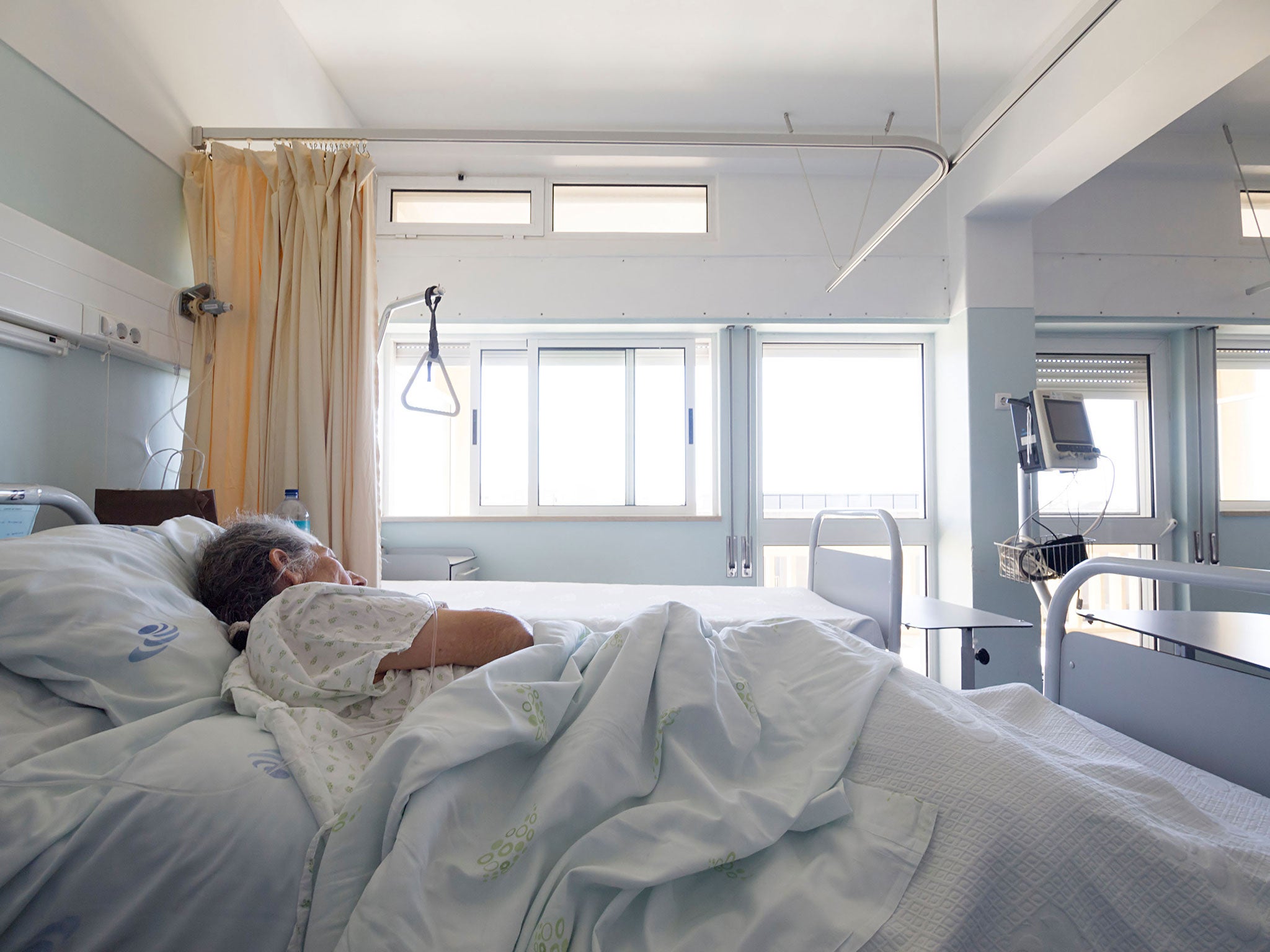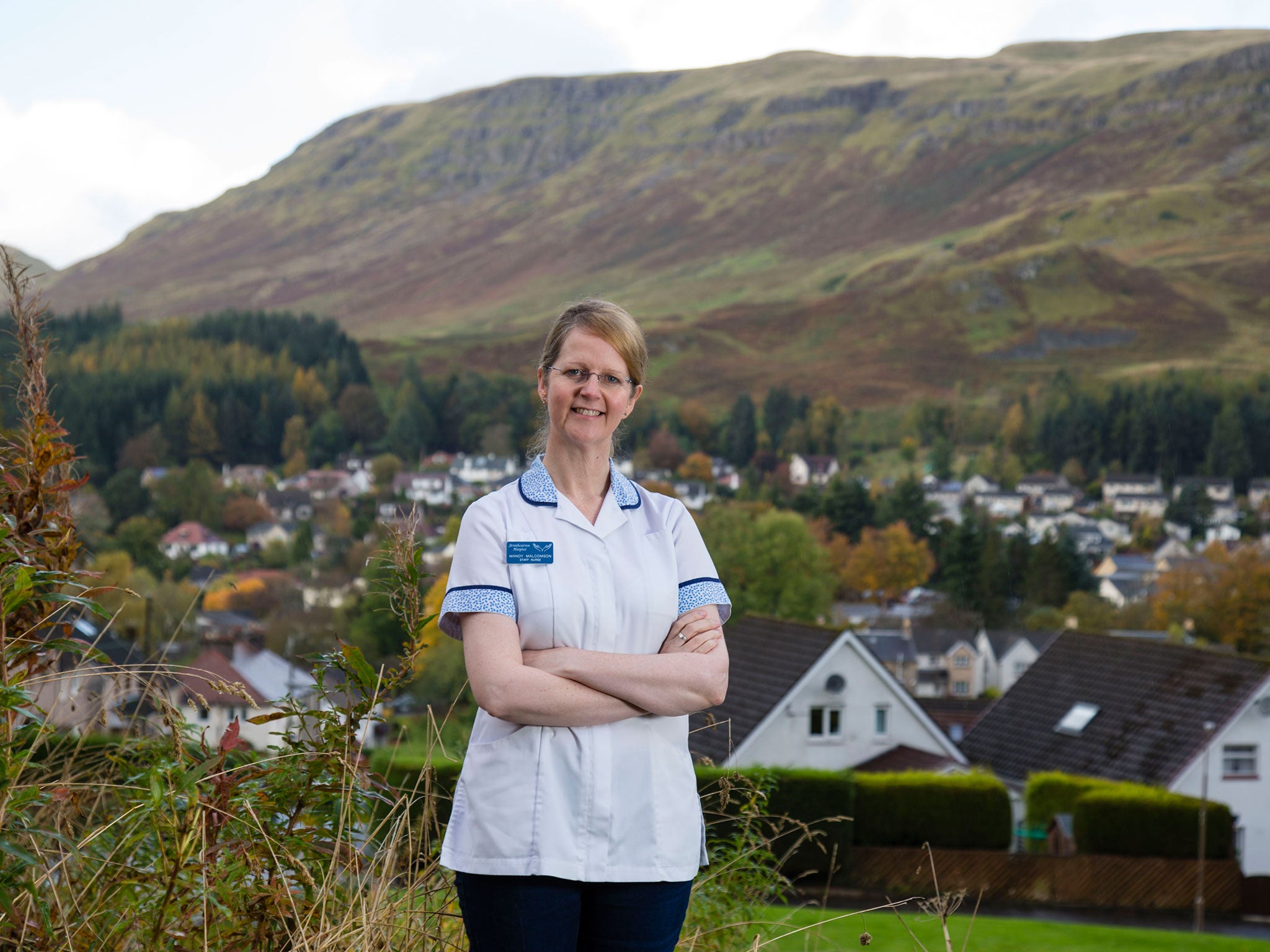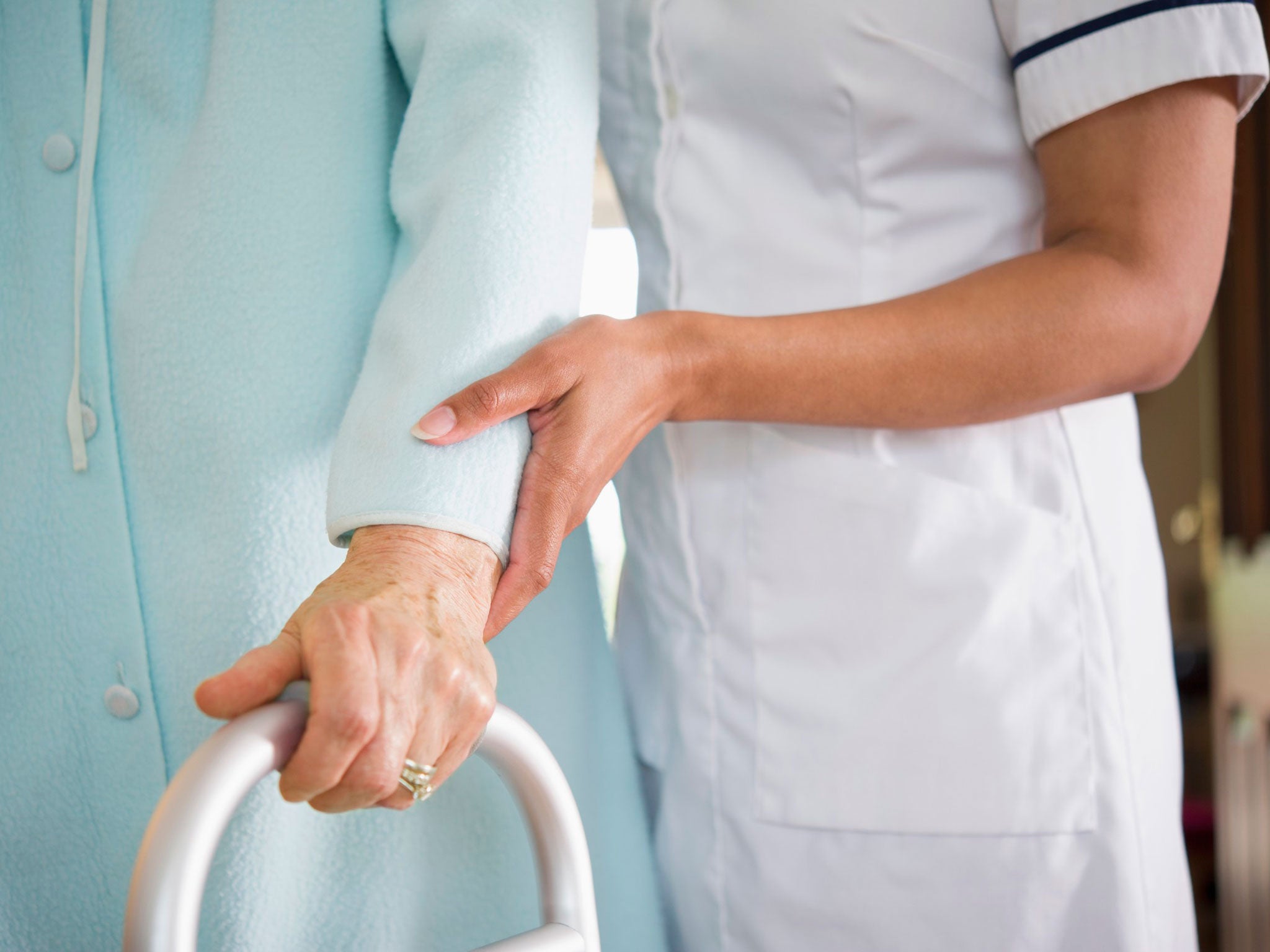Making UK a better place to die: Patients in their final days present a unique challenge to carers and hospices
Britain has been declared the best country to die in - yet hospital horror stories are still rife. Lena Corner talks to those who care for the dying and those left behind and discovers what the gentle ethos of hospice care can teach the NHS

Mandy Malcomson has been caring for the dying for around eight years. As a staff nurse at Strathcarron Hospice in Stirlingshire, her job is to attend to people as they live out their last moments on earth. She is an expert at recognising the signs of the final stages of life and in her time at Strathcarron has witnessed the deaths of almost 1,000 people.
"For me, it's a total privilege," she says. "To be allowed into people's lives at the end, and to be able help them express how they feel and what they want to do in the little time they have left is a special thing. I feel it's a really important job. It's everything I've ever wanted to do as a nurse."
Strathcarron, deep in the heart of Scotland, is one of the biggest hospices in the country and serves the people of North Lanarkshire and the Forth Valley. It has 24 beds and a day care unit that sees 100 people a week. It's the subject of a documentary called Seven Songs for a Life, by Amy Hardie, out last month, which pays homage to life, death, carers and the heroism of humans in their final days.
Malcomson, 47, started her career as an intensive care nurse but switched when she realised she wanted to work with people rather than machines. While her job is to provide regular nursing care such as comfort and pain relief, another set of skills is required, too.
"A patient said to me once, 'I've been told I'm dying but I'm actually still living. I still have to get up out of bed every morning,'" she says. "So it's about getting to know that person very quickly to try to figure out what makes them tick. It's about trying to find that little spark so I can find a way of getting a bit of joy in their life. The main part of my job is listening to people and hearing what's important to them."
In her time, Malcomson has stepped in to respond to final requests, reconcile family differences and help do tasks left undone. For the old drum major too weak to carry his instrument, she arranged for his accordion to be brought in and his final days were spent duetting with Malcomson on her guitar. For the patient who'd once had a stillborn baby, Malcomson helped organise a headstone so that final respects could be paid. And frequently she has made quiet, unofficial phone calls to family members who she has noticed may not be quite coping.
Unsurprisingly, Malcomson has been to her fair share of funerals. She does, however, have to be watchful about her involvement.
"It is emotional, you do make connections, you do become close to people and you do get sad when they die," she says. "I try not to go to too many funerals because I have to look after my own emotional well-being. It's something we, as a team, have to be very careful with. I've got quite a long drive home after work so I try to debrief then, so by time I walk in my own front door I've left the emotion behind."
After hearing Malcomson talk of her dedication to her job, it's not so surprising that a recent study declared the UK the best place in the world to die. The report by the Economist Intelligence Unit (EIU) found that the combination of our strong hospice movement, national policies and highly skilled staff has made our palliative care better than anywhere else in the world. Australia ranked second, New Zealand third and the US came in seventh.
So is it time to give ourselves a massive pat on the back and sit back safe in the knowledge that we are all going to die happy? Not quite. In fact, you don't have to look very far at all to realise there is a whole raft of publications that have come out recently in direct contradiction to our glowing EIU report. A quick flick through the public ombudsman's paper entitled Dying Without Dignity, from February this year, makes some of our practices look positively medieval. The report highlighted 12 individual cases that were a catalogue of failure, including people being left writhing in agony and begging to be allowed home to die in peace, and one patient who only found out he had terminal cancer when he read his doctor's notes.
"The question is not, 'Are we the best in the world?' but, 'Is the best in the world good enough?'" says Rob George, president of the Association for Palliative Medicine. "And if you look at the ombudsman and other reports, clearly it's not good enough. Where care is the best, it is the best, but when it's bad, it is very bad. The postcode lottery is pretty extreme. We need to improve things across the board."
This June, a review by Baroness Julia Neuberger was similarly damning and so, too, was a Care Quality Commission whose inspection of 105 hospitals over a 15-month period contained some particularly worrying statistics for those whose lives should happen to end in a hospital bed.
"In terms of end-of-life care, they found that about 40 per cent of the hospitals were inadequate," says Simon Chapman of the National Council for Palliative Care. "More frightening was that 47 per cent failed on safety in end of life and that's to do with basic stuff such as people not getting pain relief."
Hospital failings aside, it is in large part thanks to the strength of our remarkable hospice movement that the UK was placed at the top of the table. Currently there are 240 hospices in the UK, 31 of which are managed by the NHS, all striving to provide the kind of care that Malcomson offers at Strathcarron.
The movement was founded in the UK by Dame Cicely Saunders, a nurse born in 1918 who became increasingly bothered by the way she witnessed people dying. She trained as a social worker, then as a doctor, and in 1967 founded St Christopher's in south-east London – widely regarded as the world's first modern hospice.
"One of her key contributions to modern palliative care was her idea of total pain," says Heather Richardson, joint chief executive of St Christopher's. "She realised it wasn't just physical pain people experience when they are dying, but also spiritual, social and psychological. Nowadays, we include financial as well. She believed if you want to look after someone well at the end of their life you do it holistically."

Alongside that, Dame Cicely did pioneering work on pain management. "She wasn't content with the pretty blunt way of treating people – this was the 1950s, when you were lucky if you got a couple of diamorphine injections," says Richardson. "She did a lot of work around the importance of giving regular, fine tuned pain relief and showed the difference in quality of life when it was done in a scientific and carefully managed way. She set in stone the hallmarks of good palliative care." In 2005, when Dame Cicely died, she chose to do so at St Christopher's.
The word palliative comes from the Latin word palliare which means "to cloak". "By definition, the hope is that you are not necessarily troubled by what's going on with you biologically," says George. "The idea is to hide the effect of the disease so the patient can re-emerge as a person again."
It became apparent that pain management was everything when Nathan entered St Christopher's in 2012. A strong, fit, 52-year-old dancer, he had been struck with stomach pains while performing abroad in March that year. In May, he was misdiagnosed with food poisoning and in June a biopsy revealed he had incredibly aggressive, late-stage cancer of the stomach. Nathan was told he had less than two months to live. He moved into St Christopher's straight away.
As a gay man, Nathan didn't have the traditional spouse or children caring for him, but a group of four of his most beloved friends looking after him round the clock.
‘I try not to go to too many funerals, I have to look after my own emotional well-being. We have to be very careful’
"I couldn't imagine him being in a better place," says Paul, one of the friends. "It was a terrible place, but also a beautiful place. The staff became aware of the unusualness of the situation – we were all as important to Nathan as a spouse. They treated us like family."
The staff at St Christopher's were right behind them when Savile Row's Nick Tentis came in to measure Nathan up in his room for a bespoke suit which, remarkably, was made and delivered to him before he died. They encouraged the foursome as they lovingly put together Italian feasts in the kitchen, made from ingredients sourced from all over London. When Nathan died, all of them were offered counselling.
"It was a weird situation," says another friend, Simon. "They had a choir for the patients and visitors – and the first song I heard was 'Storm in a Teacup', which I thought was darkly inappropriate." When it was all over, says Simon, "I came away thinking : why is pain relief so difficult when that's all they need? Nathan was going: 'I just want to die because it hurts so much.' So we'd get upset and we'd say to the doctors: 'It's not enough.' And they'd say: 'We can't increase the dose'. I had no idea pain management was so complex or difficult."
The year previously, Simon had witnessed his father die, somewhat unexpectedly, in York Hospital. Awful as it was, by comparison, Nathan's death was beautifully managed. "With my dad, it was just, like, hang on, is there anybody that can just explain for a moment what's going on," he says. "I wanted to know what we could expect to see, as I was trying to protect my mum and sister from seeing something completely disturbing. But no one could. You just walk in and see it all. All they could do was talk in terms of mechanical failure of the body. Just don't die in hospital."
In 2009, the National Council for Palliative Care set up a coalition called Dying Matters, which is aimed at talking more openly about death and dying, trying to prepare people for and take control of what is ultimately going to happen to everyone.
"We have a legacy of bad death in Britain. It's embedded," says George. "One bad death and the memory lives on in those who remain. You only die once and the level of importance for families and for the individual of having a death that is good enough is huge. If we look at completing a life well rather than avoiding dying a death badly, then we change the whole dialogue. This is something I think is happening in this country – people are starting to have those conversations."
They're not always happy, though, and too often reveal cases where people have fallen through the gaps between the NHS and the hospice movement – or worse. Earlier this year, for example, Max Armshaw lost his father to cancer. He had been given his terminal diagnosis four months before he died and when he was struggling with the pain was taken to a hospice in Warrington.
"It was a great place and he was happy to be there. But if you're not that near the end, they are desperate to get you out to free the bed up," says Armshaw. "He wasn't completely with it and they asked him, 'Don't you want to go home? Don't you want to be with your family?' They coerced him slightly to get him out."
So, six weeks before his death, Armshaw's dad was sent home to be cared for by his 80-year old wife, with the promise of an at-home care package. "But when it came to it, no one seemed to be available," he says. "The care was farmed out to a private companythat pays its workers minimum wages but doesn't pay travel time, so they are actually on below the minimum wage. You're never going to get the best care in a situation like that. My dad started refusing medication and waking up in the middle of the night screaming. Thankfully, our GP managed to get him back into the hospice. The day after he got there, he was put on what they call end of life cycle and taken off all medication [except pain relief]."

For Adeline Musselwhite, the trauma of her mother's death was much more drawn out. It started in a private nursing home, which threatened to throw her out her as soon as her nursing needs became more complicated.
"They wanted to evict her because she had become incontinent," says Musselwhite. "I said, isn't this what you do for a living? What am I paying £1500 a week for? It was run by a charitable trust – they get a tax rebate for providing a public service – so in some ways you would expect them to behave charitably, but they don't. They are entirely mercenary.
"So I spent months trying all the private homes in Buckinghamshire. The message I got was that they only took the bed-bound, as they are easier to look after. My mum [who was still mobile] was too much hard work. In the end, it was down to one individual, an amazing woman who took her into a [hospice] partially funded by the NHS. She was horrified by our treatment. But in terms of the very, very end of life I think we probably do have a very good service," she concludes. "They brought a mattress in for my sister and let her live there for the last three days. But what happens in those months or years before you die is atrocious."
It's strange quirk of our system that, when it comes to our final days, after a lifetime of being cared for by the NHS, our fate, more often than not, is left to charities. "This is because the NHS has never really seen care of dying people or palliative care as a core part of its DNA," says Chapman. It's also because, by the very nature of the work of Cicely Saunders, the hospice movement evolved outside of the health care system.
"It's historical," says Richardson. "She was a pioneer. To implement the changes and the new approaches, she would never have been able to create the models she wanted within the existing system."
It costs around £10,000 every day to run Strathcarron, and at St Christopher's it's £32,000. That's a lot of money to amass. Richardson says there's not a day goes by when there isn't a fundraising event of some type or another. But if it's delivering care of the standard that Nathan received, or Malcomson gives out, then it's got to be worth doing. And we all need to be doing more for the movement, helping how we can, talking about how to complete a good life, so that we can all die well.
As Rob George concludes: "We should be looking to a future where the resources and the expertise are available consistently across the country, so no one should ever have to fear a bad death."
Some names have been changed
'Seven Songs for a Long Life' is now in UK cinemas with community screenings available in support of Hospice UK and the #mylastsong' campaign. sevensongsfilm.com @sevensongsfilm
Join our commenting forum
Join thought-provoking conversations, follow other Independent readers and see their replies
Comments
Bookmark popover
Removed from bookmarks